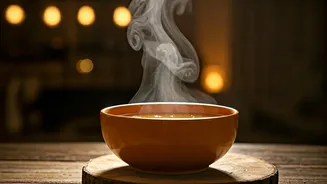Steaming for Comfort
Steam inhalation is a classic remedy for respiratory issues. When faced with the pollution-laden air of Delhi, steaming can provide significant relief
from congestion. This involves inhaling steam, which helps to loosen mucus and soothe irritated airways. You can use a bowl of hot water and a towel, or a steam inhaler if you have one. Adding a few drops of essential oils, such as eucalyptus or tea tree, can enhance the benefits. The steam helps to moisturize the nasal passages, making it easier to breathe. Aim for 10-15 minutes of steaming, two to three times a day, particularly when symptoms are at their worst. Ensure the water is not too hot to avoid burns. Keep your eyes closed during steaming to prevent irritation.
Honey and Ginger
Honey and ginger offer a natural approach to addressing coughs and sore throats, frequently exacerbated by Delhi's air quality. Honey is known for its soothing properties, and when combined with ginger, which has anti-inflammatory and antioxidant effects, it can create a potent remedy. A simple preparation involves mixing a teaspoon of honey with a small piece of grated ginger. Consume this mixture several times a day to ease coughing and reduce throat irritation. Alternatively, you can make a ginger-honey tea by steeping ginger slices in hot water and then adding honey. This warm beverage can provide additional comfort. Remember that honey should not be given to children under one year of age due to the risk of botulism.
Turmeric's Benefits
Turmeric, a common spice in Indian kitchens, is renowned for its anti-inflammatory and antioxidant properties, making it beneficial for respiratory health amidst Delhi's air pollution. The active compound in turmeric, curcumin, can help reduce inflammation in the airways. You can incorporate turmeric into your diet by adding it to your meals. Another option is to drink turmeric milk, or 'haldi doodh,' which is made by mixing a pinch of turmeric powder with warm milk. This can be especially soothing before bed. Consider adding black pepper to the turmeric mixture, as it enhances curcumin absorption. Using turmeric can help reduce congestion and strengthen your immune system, aiding in your body's defense against air pollution’s negative effects.
Hydration is Key
Staying well-hydrated is crucial for overall health, especially when dealing with the effects of Delhi's air pollution. Drinking plenty of water helps to thin the mucus in your airways, making it easier to cough up and breathe. Proper hydration also helps to keep your throat moist, reducing irritation and the likelihood of a dry cough. Aim to drink at least eight glasses of water per day. You can also include other hydrating beverages, such as herbal teas or clear soups. Avoid excessive consumption of caffeinated drinks, as they can have a diuretic effect, leading to dehydration. Keeping your body hydrated is essential for flushing out toxins and supporting your respiratory health in the face of air pollution.
Air Purifying Plants
Introducing air-purifying plants into your home can provide some relief from Delhi’s polluted air. Certain plants naturally filter indoor air, removing toxins and pollutants. Plants such as the snake plant, spider plant, and aloe vera are particularly effective. These plants absorb harmful substances and release oxygen, improving indoor air quality. Placing these plants in your bedroom and living areas can help cleanse the air you breathe. Ensure your plants receive adequate sunlight and proper care to thrive. This natural approach can create a healthier indoor environment, complementing other remedies for combating the effects of air pollution. Remember to regularly clean the leaves of your plants to remove dust and maintain their effectiveness.















